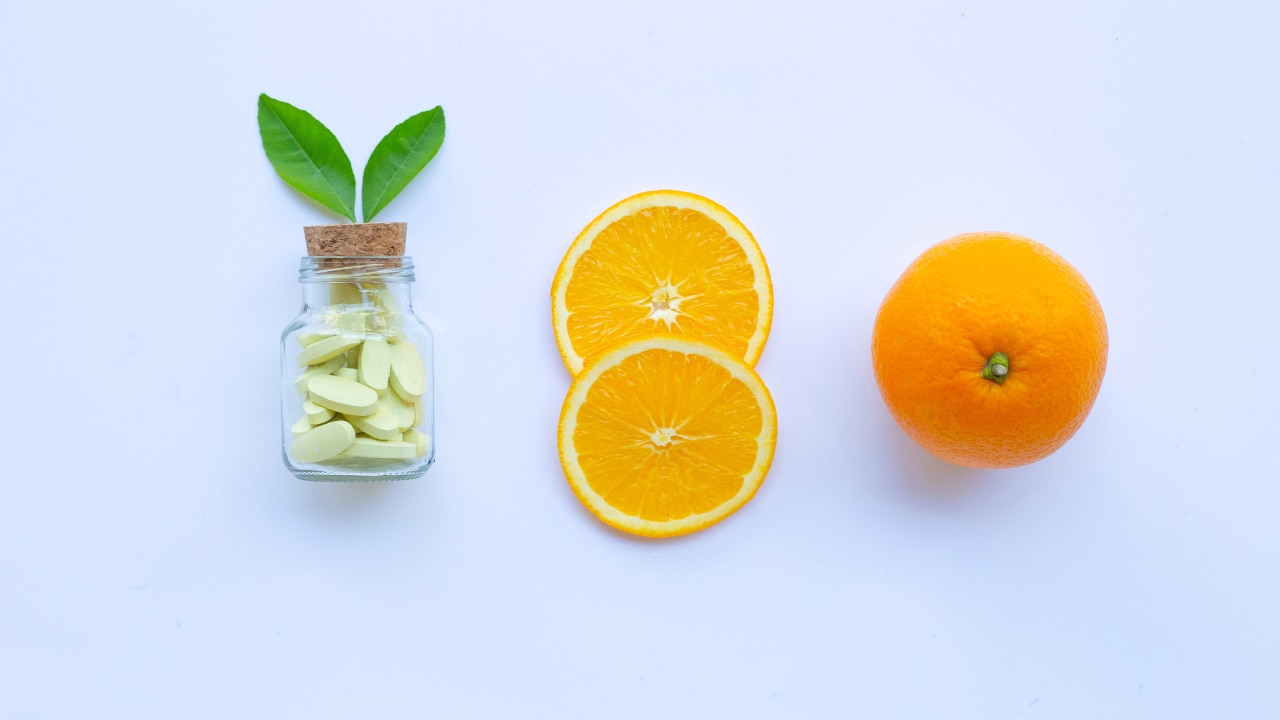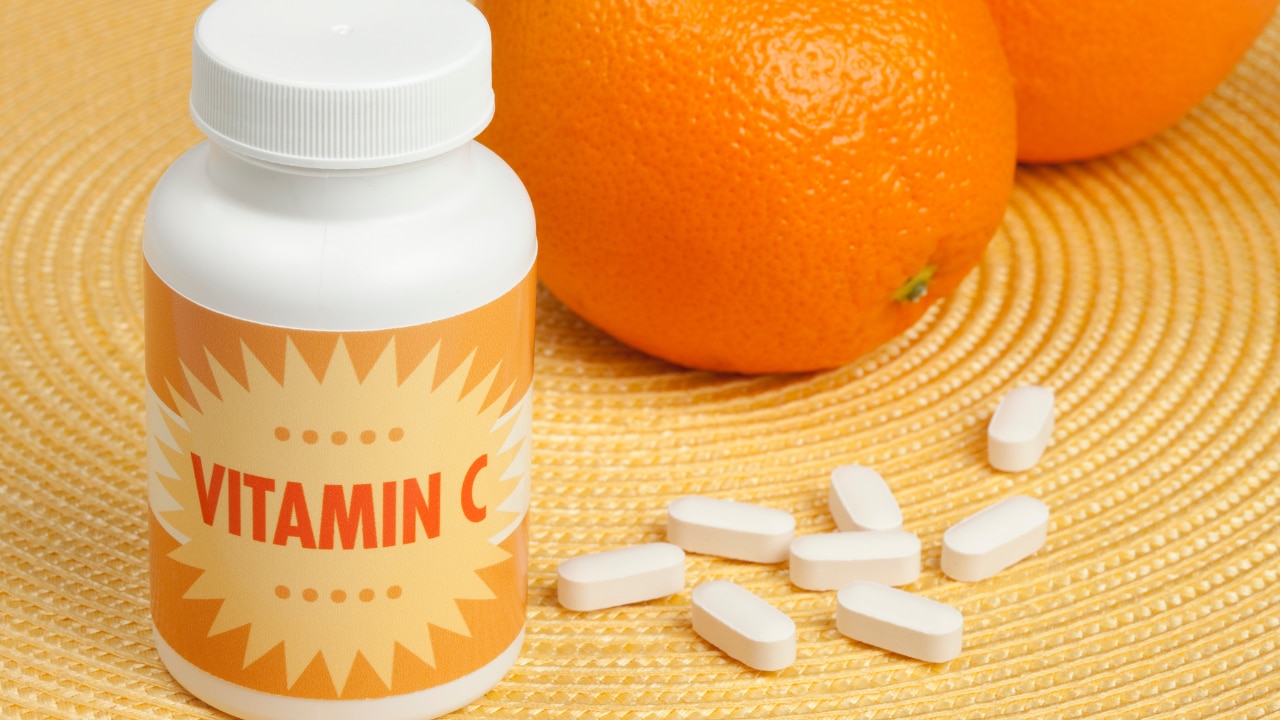- 01 What Is Vitamin C?
- 02 Benefits of Vitamin C for Health and Skin
- 03 How Much Vitamin C Per Day Should You Take? Daily Requirement by Age & Gender
- 04 Factors That Affect Vitamin C Requirement
- 05 Safe Upper Limit of Vitamin C: How Much Vitamin C Per Day Is Too Much?
- 06 Vitamin C Overdose Side Effects: What Happens If You Exceed the Limit
- 07 Best Sources of Vitamin C: Natural vs Supplements
- 08 How to Take Vitamin C Safely: Tips to Avoid Side Effects
- 09 FAQs on Vitamin C Requirements
If you've ever wondered how much vitamin C to consume, you're in the right place. Undoubtedly, vitamin C, or ascorbic acid, is a crucial nutrient that plays an important role in maintaining our overall health. If you're confused about the right dosage to take, particularly with the wide range of supplements available, read on. We consulted experts to learn more about vitamin C and our daily vitamin C requirement. Here's what they had to say.
01What Is Vitamin C?

Vitamin C is a water-soluble vitamin, which is not stored in large amounts in the body. Because our bodies cannot produce it, we must get it from your diet or supplements every day.
"Vitamin C works from the core of our cells to the surface of our skin, supporting healing, vitality, and transformation from the inside out," remarks Karishmma Chawla, functional medicine nutritionist and lifestyle educator. "I reach for this powerful nutrient to supercharge the immune system whether it's to ward off a cold or recover faster when one strikes. It's beautifully bioavailable, deeply absorbed, and works wonders for radiance and skin health."
02Benefits of Vitamin C for Health and Skin

Our bodies rely on a continuous supply of vitamin C for numerous important functions, such as:
Powerful Antioxidant:

Vitamin c protects our cells from damage by free radicals, which are unstable molecules linked to ageing and disease.
Collagen Production:

It is integral for the synthesis of collagen, a protein important for healthy skin, tendons, ligaments, and blood vessels. "Vitamin C is a vital nutrient for maintaining healthy, radiant skin. It supports collagen synthesis, helping preserve skin firmness and elasticity while minimizing fine lines and wrinkles," adds Dr. Gagan Raina, cosmetologist and aesthetic medicine specialist at Arisia Skin Clinic.
Wound Healing:

It is crucial for repairing tissues and forming scar tissue after an injury.
Immune Support:

Vitamin c supports the function of various immune cells and enhances the body's defense system.
Brain Function:

High levels are maintained in the brain, suggesting a role in neurological health.
03How Much Vitamin C Per Day Should You Take? Daily Requirement by Age & Gender

The Recommended Dietary Allowance (RDA) is the average daily level of intake sufficient to meet the nutrient requirements of nearly all healthy individuals.
How much Vitamin C per day for :
| Age Group | Gender | Recommended Daily Intake (mg) |
|---|---|---|
| Adults (19+ yrs) | Men | 90 mg |
| Adults (19+ yrs) | Women | 75 mg |
| Pregnant (19+ yrs) | Women | 85 mg |
| Breastfeeding (19+ yrs) | Women | 120 mg |
| Teens (14–18 yrs) | Boys | 75 mg |
| Teens (14–18 yrs) | Girls | 65 mg |
| Children (9–13 yrs) | All | 45 mg |
| Children (4–8 yrs) | All | 25 mg |
| Children (1–3 yrs) | All | 15 mg |
04Factors That Affect Vitamin C Requirement

Some individuals with certain conditions could increase their daily vitamin C needs, as follows:
Smoking: People who smoke, and those exposed to secondhand smoke, need an additional 35 mg per day.
Pregnancy and Lactation: The body requires higher amounts to support both the mother and the developing fetus or infant.
Illness: Some experts suggest higher doses might support the body during a cold or flu.
05Safe Upper Limit of Vitamin C: How Much Vitamin C Per Day Is Too Much?

The Tolerable Upper Intake Level (UL) is the maximum daily intake considered unlikely to cause adverse health effects. Consuming amounts greater than the UL, especially from supplements, is not recommended.
| Age Group | Safe Upper Limit (mg/day) | Notes |
|---|---|---|
| Adults (19+ years) | 2,000 mg/day | Exceeding this may cause digestive issues and acidity. |
| Adolescents (14–18 years) | 1,800 mg/day | Maintain balance with natural food sources. |
| Children (9–13 years) | 1,200 mg/day | High doses may lead to stomach cramps or diarrhea. |
| Children (4–8 years) | 650 mg/day | Use supplements cautiously; prefer fruits and vegetables. |
| Children (1–3 years) | 400 mg/day | Monitor intake; excess may lead to kidney stone risk. |
Expert Insights: "Excess vitamin C can lead to acidity and digestive upset, so it's best to get your daily dose from fresh fruits and vegetables instead of relying heavily on supplements," declares Dr. Bindu Sthalekar, celebrity dermatologist and founder of Skin Smart Solutions.
06Vitamin C Overdose Side Effects: What Happens If You Exceed the Limit

Since vitamin C is water-soluble, severe overdose is rare. However, here are the top vitamin C side effects:
- Gastro Distress: The most common side effects are diarrhea, nausea, vomiting, cramps, and heartburn, which happen when the body tries to flush out the excess.
- Kidney Stones — High doses of vitamin C are converted into oxalate, which can bind with calcium and form calcium‑oxalate kidney stones in susceptible individuals. Biomedicus+3Healthline+3iClinIQ+3
- Iron Overload (in susceptible individuals) — Because vitamin C enhances iron absorption, taking too much may exacerbate iron accumulation in people with disorders like hereditary hemochromatosis, potentially causing organ damage.
07Best Sources of Vitamin C: Natural vs Supplements

The best way to get vitamin C is through your diet, as fruits and vegetables also have fibre and other beneficial nutrients.
Natural Sources (Food):

- Fruits: Red and green bell peppers, oranges and other citrus fruits, kiwifruit, strawberries, papaya, cantaloupe, and guava.
"The easiest way of getting your daily dose of vit C is just consuming one Indian gooseberry a day. Guava is your next bet," mentions Kamna Bhandari, nutritionist and co-founder, Intermittent Fasting and Mindful Living.
"Vitamin C does more than boost immunity — it helps your body build collagen that keeps joints and tendons resilient through every workout. I like pairing vitamin C rich foods with iron rich foods, for example Indian gooseberries with beetroot juice, as it enhances absorption and improves iron uptake, giving your muscles better oxygen delivery," adds Nyela Kapadia, fitness expert and co-founder of Intermittent Fasting and Mindful Living.
- Vegetables:
Broccoli, brussels sprouts, cauliflower, kale, and tomatoes. To maximize intake, consume these foods raw or use minimal cooking methods like light steaming.
Supplements:

Supplements come in several forms, including ascorbic acid tablets, chewable wafers, powder, and mineral ascorbates.
08How to Take Vitamin C Safely: Tips to Avoid Side Effects

Follow these tips to safely supplement and meet your Vitamin C needs:
Do Not Exceed the Upper Limit: Stick to 2,000 mg/day (for adults) or less unless explicitly instructed otherwise by a doctor.
Combine with Meals and Hydrate: Consume your supplements with food to help buffer the acidity and reduce the likelihood of stomach upset. Also, drink lots of water to help your body process and excrete any excess vitamin C.
Therefore, a balanced approach ensures you reap all the powerful benefits of this important vitamin without overdoing it. If you have additional questions or concerns about vitamin C, it's best to consult a doctor.
09FAQs on Vitamin C Requirements
Here are the top questions about vitamin C answered by the experts:
Q: Can consuming vitamin C prevent or cure the common cold?
A: Some studies suggest that regular intake may slightly minimise the duration or severity of a cold, particularly in individuals under severe physical stress, but it does not prevent a cold in the general population.
Q: Which skincare products use Vitamin C as their ingredient?
Several skincare products such as the Simple Moisturising Facial Wash, the Pond's Super Light Gel Oil-Free Moisturiser and the Simple Protect N Glow Vitamin C Moisturising Glow Gel have Vitamin C as their ingredient.









